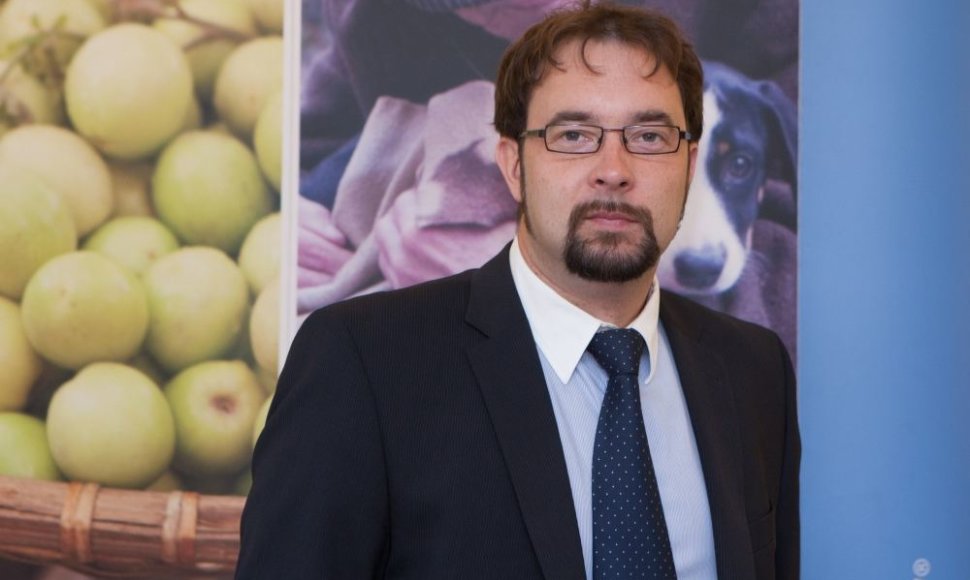“A person should stay in one position for 3 to 4 years, after which he'd better look for self-expression in either a different post of the same company, or somewhere outside, with a different company. You should never rule out that this is where you should be, where new challenges and achievements await you,” Kaikaris says.
Kaikaris, who had previously worked for IBM and Oracle offices in Lithuania, was named the new head of Microsoft Lietuva in May. He says he will combine the new position with something that has long been his hobby, and an extra job for the last 17 years, namely, commenting Formula 1 race.
Kaikaris, who is still warming up to the office of the IT giant, hates stereotypes and prejudices, so he is rather reserved when it comes to sharing future plans. Change, however, is a constant companion on his career path.
- Why did you decide to apply for the head position in Microsoft Lietuva? Was it a well-planned decisioned?
-After spending almost five years with Oracle, my wife and I talked and decided that it was a right moment to make a pause and we would be sorry if we failed to make use of it. In other countries, they call it a sabbatical – creative break.
Late last year, we packed our bags, took two of our little ones (we have four kids, the elder ones had to go to school) and went to Asia. We spent two months in Thailand, one in Vietnam.
I brought twenty kilos of books, I spent my time reading them, being with my family, devoting myself to some of my hobbies that I'd previously lacked time for, like kitesurfing or yoga.
The current technology, internet, allowed us to stay in touch with friends and family.
Even before we left, we knew we were going for merely three months, everything was planned, and when I got back, I started to think what's next. Among the more serious options was Microsoft and I did not hesitate to make it happen.
- What were other options?
- Other options ranged from a complete change of direction, perhaps a new startup or going freelance, to returning to the previous corporation. There were also many local companies working in IT and other areas. I deliberated a lot, thought it all out and decided to return to IT.
- Does it represent a step up the career ladder?
- It is hard to say – I headed the Lithuanian office at Oracle and I do the same at Microsoft. However, I see it as giving me wider opportunities because of a bigger team. Besides, I find Microsoft's product solutions, work, breadth in the market more exciting. It's a new challenge.
- What was the selection process like? How long did it take and how did you have to prove worthy of the position?
- The beginning of the process might vary – you can apply yourself and send a CV; another option is to have someone come to you; the third way is called headhunting – when someone invites you to work with them while you're still employed elsewhere.
In this case, it was something in between – I had an interview, where they asked me if I was interested, if I wanted to work there; also, if they wanted that I applied. After that I sent my CV and had the first long-distance interview where we talked about common ground, about myself. I later met with many people responsible for specific areas in the region. They talked to me, assessed my competencies, experiences and composed a certain image of myself in their heads. Conversely, I also discovered with whom I'd be working, what and how I'd have to do, etc.
I paid a visit to Microsoft headquarters in Munich, met those people eye-to-eye, we talked. It all took two months, while the number of interviews and meetings is well within the two-figure range. Most of the meetings were with people from within the region. I haven't had the chance yet to meet Steve Ballmer (head of Microsoft).
- You've only been Microsoft Lietuva leader for a few weeks now. Have you already warmed up to the task? Is there much work waiting on your desk?
- I don't think you can ever get completely warmed up to a job. It is a process. It develops. The market and the company are very dynamic, there's constant change.
I know the IT world quite well, yet what I have here are new people, new products, new situations. The information flow is massive, both quantitatively and qualitatively. After all, it is a huge company, it knows how to hire people, what problems and challenges await them. They have prepared information packages, an integration plan – what to do, what to pay attention to, what things and access I need, etc. All this is well sorted out, I'm becoming part of this organism.
- Have you had to make a decision – or are you still just looking around?
- Yes, I have had to make decisions relating to various areas from day one. That's what a leader does. On the other hand, oftentimes, decision making is done by the team. At the moment, we are approaching the end of a fiscal year – it is a serious and hot period.
- What was your opinion on Microsoft and its products before you started in the job?
- I've long known and used Microsoft products. My father brought our first computer in 1989, after a visit to the US. It had a colour screen, MS DOS command line, there were also many big and soft discs. These mostly contained games, but in one of them, I found Windows.
It was, I think, version two – rather primitive, without multitasking or graphic interface. What was interesting was that you could open several tools on the screen – say, a clock, file and application managers, a primitive game – and it seemed very handy and progressive.
So I've known and used Microsoft products since a very long time. I might have not tried every single version of Windows, but I started very early indeed.
Certainly, my opinion about them was very positive, I wouldn't have used them otherwise. Now that I'm a member of the Microsoft family, I will only expand and deepen my knowledge.
- Is it true that you are using a Mac? Will it stay in your home now that you're with Microsoft?
- Five years ago, I purchased a Mac with a big high-resolution screen. But after my first experience with Mac OS I decided that I feel more comfortable with Windows, in terms of functionality, compatibility, and habits. So I have Windows installed on my personal computer.
I have respect for all market players, I'm glad there is competition that encourages development, gives consumers a choice. After all, I am also a consumer.
Kristijonas Kaikaris
Born 10 June 1972. Studied medicine.
Between 1998 and 2002, owner of Mikrotera.
Between 2002 and 2007, head of sales at IBM Lietuva. 2007-2011 headed the Lithuanian office of Oracle.
Married to Vilma Kaikarienė. Has four children: Jonas Bernardas, Ieva, Adomas, Greta.













